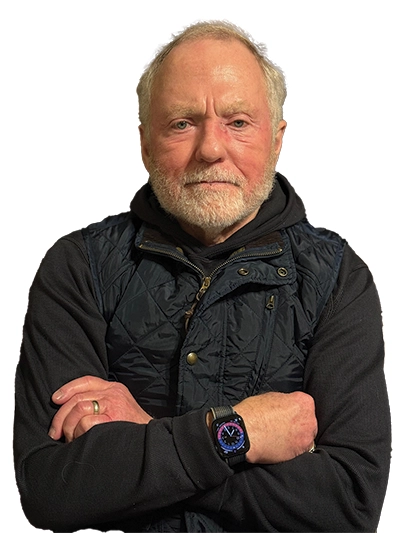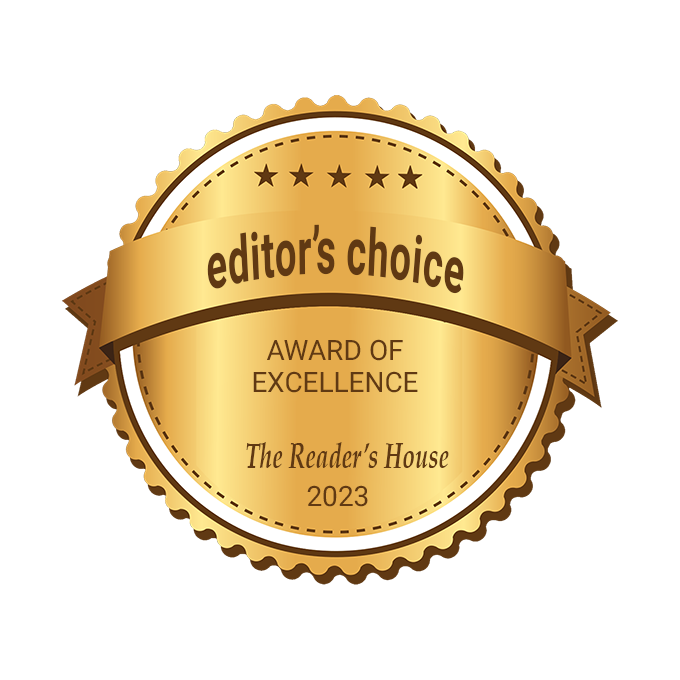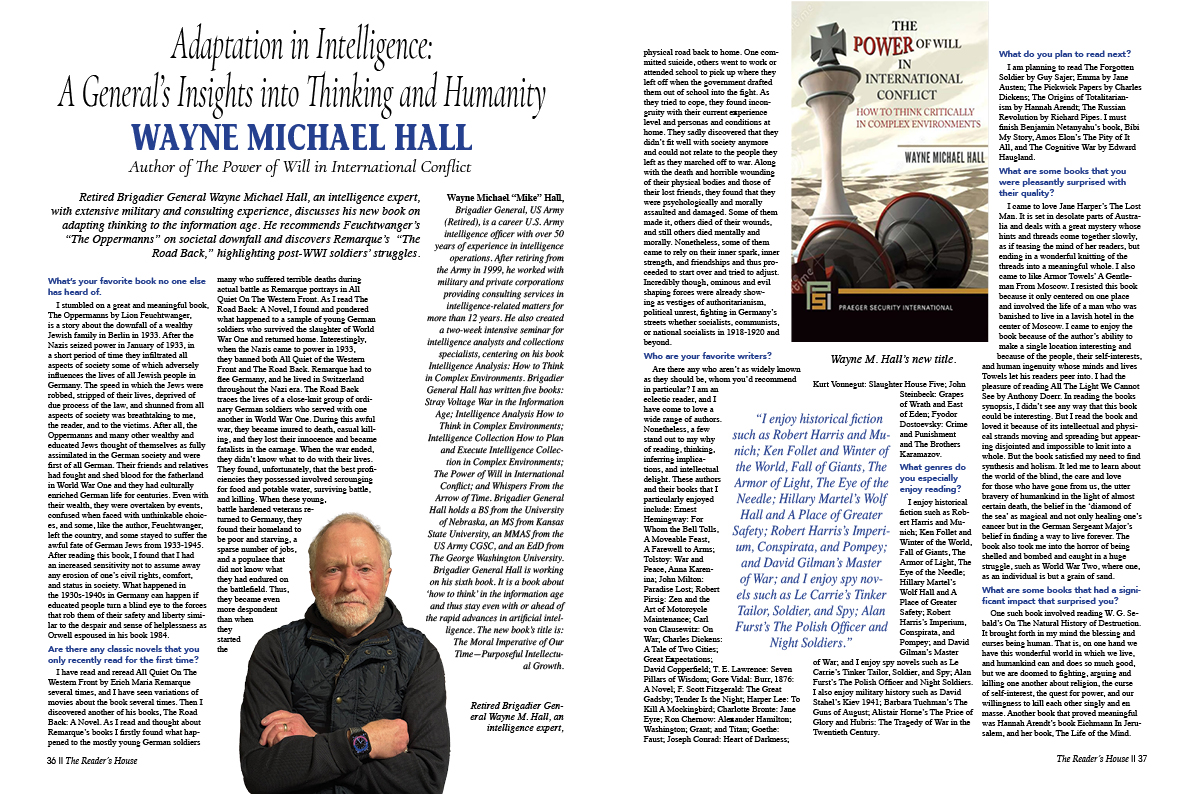Wayne Michael Hall
Adaptation in Intelligence:
A General's Insights into Thinking and Humanity
Provocative Impact:
Books Shaping Perspectives on Humanity
Retired Brigadier General Wayne Michael Hall, an intelligence expert, with extensive military and consulting experience, discusses his new book on adapting thinking to the information age. He recommends Feuchtwanger’s “The Oppermanns” on societal downfall and discovers Remarque’s “The Road Back,” highlighting post-WWI soldiers’ struggles.

of modern intelligence and societal reflections in his latest interview,
unraveling insights from history and literature.
Wayne Michael “Mike” Hall, Brigadier General, US Army (Retired), is a career U.S. Army intelligence officer with over 50 years of experience in intelligence operations. After retiring from the Army in 1999, he worked with military and private corporations providing consulting services in intelligence-related matters for more than 12 years. He also created a two-week intensive seminar for intelligence analysts and collections specialists, centering on his book Intelligence Analysis: How to Think in Complex Environments. Brigadier General Hall has written five books: Stray Voltage War in the Information Age; Intelligence Analysis How to Think in Complex Environments; Intelligence Collection How to Plan and Execute Intelligence Collection in Complex Environments; The Power of Will in International Conflict; and Whispers From the Arrow of Time. Brigadier General Hall holds a BS from the University of Nebraska, an MS from Kansas State University, an MMAS from the US Army CGSC, and an EdD from The George Washington University. Brigadier General Hall is working on his sixth book. It is a book about ‘how to think’ in the information age and thus stay even with or ahead of the rapid advances in artificial intelligence. The new book’s title is: The Moral Imperative of Our Time—Purposeful Intellectual Growth.
What’s your favorite book no one else has heard of.
I stumbled on a great and meaningful book, The Oppermanns by Lion Feuchtwanger, is a story about the downfall of a wealthy Jewish family in Berlin in 1933. After the Nazis seized power in January of 1933, in a short period of time they infiltrated all aspects of society some of which adversely influences the lives of all Jewish people in Germany. The speed in which the Jews were robbed, stripped of their lives, deprived of due process of the law, and shunned from all aspects of society was breathtaking to me, the reader, and to the victims. After all, the Oppermanns and many other wealthy and educated Jews thought of themselves as fully assimilated in the German society and were first of all German. Their friends and relatives had fought and shed blood for the fatherland in World War One and they had culturally enriched German life for centuries. Even with their wealth, they were overtaken by events, confused when faced with unthinkable choices, and some, like the author, Feuchtwanger, left the country, and some stayed to suffer the awful fate of German Jews from 1933-1945. After reading this book, I found that I had an increased sensitivity not to assume away any erosion of one’s civil rights, comfort, and status in society. What happened in the 1930s-1940s in Germany can happen if educated people turn a blind eye to the forces that rob them of their safety and liberty similar to the despair and sense of helplessness as Orwell espoused in his book 1984.
Are there any classic novels that you only recently read for the first time?
I have read and reread All Quiet On The Western Front by Erich Maria Remarque several times, and I have seen variations of movies about the book several times. Then I discovered another of his books, The Road Back: A Novel. As I read and thought about Remarque’s books I firstly found what happened to the mostly young German soldiers many who suffered terrible deaths during actual battle as Remarque portrays in All Quiet On The Western Front. As I read The Road Back: A Novel, I found and pondered what happened to a sample of young German soldiers who survived the slaughter of World War One and returned home. Interestingly, when the Nazis came to power in 1933, they banned both All Quiet of the Western Front and The Road Back. Remarque had to flee Germany, and he lived in Switzerland throughout the Nazi era. The Road Back traces the lives of a close-knit group of ordinary German soldiers who served with one another in World War One. During this awful war, they became inured to death, casual killing, and they lost their innocence and became fatalists in the carnage. When the war ended, they didn’t know what to do with their lives. They found, unfortunately, that the best proficiencies they possessed involved scrounging for food and potable water, surviving battle, and killing. When these young, battle hardened veterans returned to Germany, they found their homeland to be poor and starving, a sparse number of jobs, and a populace that did not know what they had endured on the battlefield. Thus, they became even more despondent than when they started the physical road back to home. One committed suicide, others went to work or attended school to pick up where they left off when the government drafted them out of school into the fight. As they tried to cope, they found incongruity with their current experience level and personas and conditions at home. They sadly discovered that they didn’t fit well with society anymore and could not relate to the people they left as they marched off to war. Along with the death and horrible wounding of their physical bodies and those of their lost friends, they found that they were psychologically and morally assaulted and damaged. Some of them made it, others died of their wounds, and still others died mentally and morally. Nonetheless, some of them came to rely on their inner spark, inner strength, and friendships and thus proceeded to start over and tried to adjust. Incredibly though, ominous and evil shaping forces were already showing as vestiges of authoritarianism, political unrest, fighting in Germany’s streets whether socialists, communists, or national socialists in 1918-1920 and beyond.
Who are your favorite writers?
Are there any who aren’t as widely known as they should be, whom you’d recommend in particular? I am an eclectic reader, and I have come to love a wide range of authors. Nonetheless, a few stand out to my why of reading, thinking, inferring implications, and intellectual delight. These authors and their books that I particularly enjoyed include: Ernest Hemingway: For Whom the Bell Tolls, A Moveable Feast, A Farewell to Arms; Tolstoy: War and Peace, Anna Karenina; John Milton: Paradise Lost; Robert Pirsig: Zen and the Art of Motorcycle Maintenance; Carl von Clausewitz: On War; Charles Dickens: A Tale of Two Cities; Great Expectations; David Copperfield; T. E. Lawrence: Seven Pillars of Wisdom; Gore Vidal: Burr, 1876: A Novel; F. Scott Fitzgerald: The Great Gadsby; Tender Is the Night; Harper Lee: To Kill A Mockingbird; Charlotte Bronte: Jane Eyre; Ron Chernow: Alexander Hamilton; Washington; Grant; and Titan; Goethe: Faust; Joseph Conrad: Heart of Darkness; Kurt Vonnegut: Slaughter House Five; John Steinbeck: Grapes of Wrath and East of Eden; Fyodor Dostoevsky: Crime and Punishment and The Brothers Karamazov.
What genres do you especially enjoy reading?
I enjoy historical fiction such as Robert Harris and Munich; Ken Follet and Winter of the World, Fall of Giants, The Armor of Light, The Eye of the Needle; Hillary Martel’s Wolf Hall and A Place of Greater Safety; Robert Harris’s Imperium, Conspirata, and Pompey; and David Gilman’s Master of War; and I enjoy spy novels such as Le Carrie’s Tinker Tailor, Soldier, and Spy; Alan Furst’s The Polish Officer and Night Soldiers. I also enjoy military history such as David Stahel’s Kiev 1941; Barbara Tuchman’s The Guns of August; Alistair Horne’s The Price of Glory and Hubris: The Tragedy of War in the Twentieth Century.
What do you plan to read next?
I am planning to read The Forgotten Soldier by Guy Sajer; Emma by Jane Austen; The Pickwick Papers by Charles Dickens; The Origins of Totalitarianism by Hannah Arendt; The Russian Revolution by Richard Pipes. I must finish Benjamin Netanyahu’s book, Bibi My Story, Amos Elon’s The Pity of It All, and The Cognitive War by Edward Haugland.
What are some books that you were pleasantly surprised with their quality?
I came to love Jane Harper’s The Lost Man. It is set in desolate parts of Australia and deals with a great mystery whose hints and threads come together slowly, as if teasing the mind of her readers, but ending in a wonderful knitting of the threads into a meaningful whole. I also came to like Armor Towels’ A Gentleman From Moscow. I resisted this book because it only centered on one place and involved the life of a man who was banished to live in a lavish hotel in the center of Moscow. I came to enjoy the book because of the author’s ability to make a single location interesting and because of the people, their self-interests, and human ingenuity whose minds and lives Towels let his readers peer into. I had the pleasure of reading All The Light We Cannot See by Anthony Doerr. In reading the books synopsis, I didn’t see any way that this book could be interesting. But I read the book and loved it because of its intellectual and physical strands moving and spreading but appearing disjointed and impossible to knit into a whole. But the book satisfied my need to find synthesis and holism. It led me to learn about the world of the blind, the care and love for those who have gone from us, the utter bravery of humankind in the light of almost certain death, the belief in the ‘diamond of the sea’ as magical and not only healing one’s cancer but in the German Sergeant Major’s belief in finding a way to live forever. The book also took me into the horror of being shelled and bombed and caught in a huge struggle, such as World War Two, where one, as an individual is but a grain of sand.
What are some books that had a significant impact that surprised you?
One such book involved reading W. G. Sebald’s On The Natural History of Destruction. It brought forth in my mind the blessing and curses being human. That is, on one hand we have this wonderful world in which we live, and humankind can and does so much good, but we are doomed to fighting, arguing and killing one another about religion, the curse of self-interest, the quest for power, and our willingness to kill each other singly and en masse. Another book that proved meaningful was Hannah Arendt’s book Eichmann In Jerusalem, and her book, The Life of the Mind.
Follow Wayne Michael:
This "Editor's Choice, Award of Excellence"
is presented to Mr. Wayne Michael Hall
and a select group of exceptional authors
by The Reader's House magazine

This interview is showcased in the magazine's 40th issue.
Tap the image to access and read on the template page.







